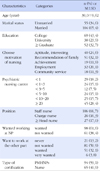Abstract
Purpose
This study was done to investigate the relation between psychiatric nurse image, job satisfaction and assertiveness of psychiatric mental health nurses.
Methods
The participants for this study were 159 psychiatric nurses in G-city and J-province. The instruments were the Psychiatric Nurses Image Scale, Job Satisfaction Scale, and Assertiveness Scale. Collected data were analyzed using mean, t-test, ANOVA, and Pearson' correlation coefficients with the SPSS/WIN 20.0 program.
Results
Mean scores for psychiatric nurse image, job satisfaction, and assertiveness, were 3.9±0.5 and 3.3±0.4 and 93.5±12.0 respectively. Significant positive correlations were found between psychiatric nurse image and job satisfaction (r=.51, p<.001), and assertiveness (r=.25, p=.002).
Conclusion
The result indicate that nurses with higher levels of psychiatric nurses image disposition exhibit positive job satisfaction, and assertiveness. Therefore it would be helpful to provide intervention programs to improve the psychiatric nurse image, job satisfaction, and assertiveness of psychiatric nurses.
Figures and Tables
References
1. Kim GH, Kim JY, Limb JR. Mediating effect of psychological empowerment in relationship between professional self-concept and burnout in psychiatric nurses. J Korean Acad Psychiatr Ment Health Nurs. 2012; 21(3):229–237. http://dx.doi.org/10.12934/jkpmhn.2012.21.3.229.

2. Happell B. Putting all the pieces together: exploring workforce issues in mental health nursing. Contemp Nurse. 2008; 29:43–52. http://dx.doi.org/10.5172/conu.673.29.1.43.

3. McKie A, Naysmith S. Promoting critical perspectives in mental health nursing education. J Psychiatr Ment Health Nurs. 2014; 21(2):128–137. http://dx.doi.org/10.1111/jpm.12061.

4. Gang MH. Critical thinking disposition and self-esteem of psychiatric mental health nurses. J Korean Acad Psychiatr Ment Health Nurs. 2011; 20(4):404–413.

5. Burnard P, Fothergill A. Community mental health nurses in Wales: self reported stressors and coping strategies. J Psychiatr Ment Health Nurs. 2000; 7(6):523–528. http://dx.doi.org/10.1046/j.1365-2850.2000.00351.x.

6. Happell B, Martin T, Pinikahana J. Burnout and job satisfaction: a comparative study of psychiatric nurses from forensics and a mainstream mental health service. Int J Ment Health Nurs. 2003; 12(1):39–47. http://dx.doi.org/10.1046/j.1440-0979.2003.00267.x.

7. Strasen LL. The image of professional nursing strategies for action. Philadelphia: J. B. Lippincott. Co;1990. p. 200.
8. Hugues K. Quality & Marking issue in nursing education. Br J Nurs. 2000; 9(12):763–768.
9. Ellenbecker CH, Porell FW, Samia L, Byleckie JJ, Milburn M. Predictors of home healthcare nurse retention. J Nurs Scholarsh. 2008; 40(2):151–160. http://dx.doi.org/10.1111/j.1547-5069.2008.00220.x.

10. Yamagishi M, Kobayashi T, Nagami M, Shimazu A, Kageyama T. Effect of web-based assertion training for stress management of Japanese nurses. J Nurs Manag. 2007; 15(6):603–607. http://dx.doi.org/10.1111/j.1365-2834.2007.00739.x.

11. Timmins F, McCabe C. How assertive are nurses in the workplace? a preliminary pilot study. J Nurs Manag. 2005; 13(1):61–67. http://dx.doi.org/10.1111/j.1365-2834.2004.00492.x.

12. Beatrice JK, Suzanne B, Sue N. The image of the nurse on the internet. Nurs Outlook. 2007; 55(4):182–188. http://dx.doi.org/10.1016/j.outlook.2006.09.002.

13. Choi J, Ha NS. The relationship among image of nurses, self esteem and professional socialization in nursing students. J Korean Acad Nurs Adm. 2009; 15(1):54–63.
14. Milsen K, De Busser T, Kavaert A, Abraham I, Dierckx de CB. The evolving professional nursing self-image of students in baccalaureate programs: A cross-sectional survey. Int J Nurs Stud. 2010; 47(6):688–698. http://dx.doi.org/10.1016/j.ijnurstu.2009.11.008.

15. Seo EH. Nurses' image perceived by nursing and health allied college students in Korea. J Korean Acad Nurs Adm. 2009; 15(4):610–616.
16. Bang KS, Park HJ. Correlation of assertiveness and depression in clinical nurses. J Korean Clin Nurs Res. 2008; 14(2):93–102.
17. Bong YS, So HS, You HS. A study on the relationship between job stress, self-efficacy and job satisfaction in nurses. J Korean Acad Nurs Adm. 2009; 15(3):425–433.
18. Yoon YK. A study on the correlation between violence experience, assertiveness and burnout of nurses working in psychiatric wards [master's thesis]. [Seoul]: Ewha Womans University;2010. 83.
19. Yang S, Lee GJ, Yu SJ. A comparative study on work satisfaction of PMHNPs in the hospital and community. J Korean Acad Psychiatr Ment Health Nurs. 2004; 13(4):487–495.
20. Kim HJ. Work stress and job satisfaction of community mental health nurses in south Korea: A qualitative content analysis. J Korean Acad Psychiatr Ment Health Nurs. 2013; 22(4):295–306. http://dx.doi.org/10.12934/jkpmhn.2013.22.4.295.

21. Cho YH. Development of a psychiatric nurses image scale: focused on nursing students [master's thesis]. [Gwangju]: Chosun University;2010. 51.
22. Weiss DJ, Dawis RV, England GW, Lofquist LH. Manual for the minnesota satisfaction questionnaire. Minneapolis: University of Minnesota, Industrial Relations Center;1967. p. 54.
23. Choi YJ. The analysis of the factors related with job satisfaction for registered nurses [master's thesis]. [Kimhae]: Inje University;2003. 35.
24. Rathus SA. An experimental in a group setting. J Behav Ther Exp Psychiatry. 1973; 3(2):81–86.
25. Ha YS, Kim SH, Moon CH, Suk SR, Yoon JR, Lee MJ. Aggressive, passive assertiveness program. J Stud Guid. 1983; 16(1):1–50.
26. Park KM, Kwon SJ, Chae SO, Park JE, Lee KH, Jung SH, et al. Nurse's image perceived by nurses and population groups. Keimyung J Nurs Sci. 2009; 13(1):11–20.
27. KPMHNA [Internet]. Seoul: The Korean Psychiatric and Mental Health Nursing Association;c2013. cited 2014 Mar 26. Available from: http://www.kpmhna.or.kr/sub2/2_3.php.
28. Bong YS, So HS, You HS. A study on the relationship between job stress, self-efficacy and job satisfaction in nurses. J Korean Acad Nurs Admin. 2009; 15(3):425–433.
29. Bang KS, Park HJ. Correlation of assertiveness and depression in clinical nurses. J Korean Clin Nurs Res. 2008; 14(2):93–102.




 PDF
PDF ePub
ePub Citation
Citation Print
Print






 XML Download
XML Download